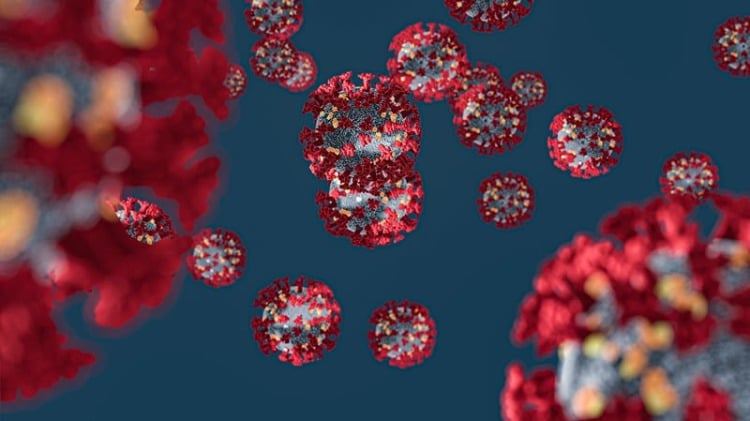Building the immune system and understanding the definition of immunity – An overview
Without building up the immune system, our body can be open to attack by bacteria, viruses, parasites and other pathogens. These are all elements that are not only found in the body and are important for the survival of the individual. When functioning properly, the immune system recognizes a variety of threats and distinguishes them from the body's healthy tissue. Especially in the times of the coronavirus epidemic, it is important for everyone to understand how the immune system works and how they can strengthen their immunity with little effort.
Build and understand your own immune system

Our organism is a huge network of cells and tissues that constantly take care of the health of the body. The immune system is therefore part of the whole body because it includes many types of cells, organs, proteins and tissues. Most importantly, it naturally selects healthy cells and eliminates dead and defective cells that don't meet the standards of perfect functionality. When immunity is faced with pathogens, the body creates a so-called immune response. At conception, immunity builds up with the parents' genetically transmitted memories of the cells. So the immune system develops its own consciousness and acts adaptively, whereby it remembers the body and can protect it by building immunity.

We can divide the immune system into categories: innate immunity and adaptive immunity. The innate immunity is the immune system with which we are born. This mainly consists of barriers on and in the body that keep threats away. The components of innate immunity include skin, stomach acid, enzymes contained in tears and skin oils, mucus and the cough reflex. There are also chemical components of innate immunity, including substances called interferon and interleukin. However, innate immunity is not specific, which means that it cannot protect us from certain threats.

Adaptive or acquired immunity, on the other hand, targets certain threats to the body. Adaptive immunity is more complex than innate immunity. With adaptive immunity, the body has to process and recognize the danger. Then the immune system produces antibodies that it has developed specifically for the pathogens. After neutralizing the threat, the adaptive immune system stores its immune response, making future responses to the same germ more efficient. All this is reinforced by about 5 liters of blood and lymph. Accordingly, these transport all elements that fight pathogens and other substances.
Main components of immunity
The lymph nodes are small, bean-shaped structures that produce and store cells. These fight infections and diseases and are part of the whole lymphatic system. This consists of bone marrow, spleen, thymus and lymph nodes. The lymph nodes also contain lymph, the clear fluid that transports these cells to different parts of the body. When the body fights infection, the lymph nodes can enlarge and feel sore.

The spleen is the largest lymphatic organ in the body, located on your left side, under your ribs, and above your stomach. It contains white blood cells that fight infections or diseases. The spleen also helps control the amount of blood in the body and discard old or damaged blood cells. In addition, the bone marrow is a yellow tissue in the middle of the bones that produces white blood cells. This spongy tissue in some bones, like the hip and thigh bones, contains immature cells, or the so-called stem cells. Stem cells, especially embryonic stem cells derived from in vitro fertilized eggs, are valued for their flexibility to transform into any human cell.

The lymphocytes are small white blood cells that also play a major role in the body's defense against disease. These first types of lymphocytes are B cells that produce antibodies. The latter attack bacteria and toxins. T cells are the other type that help destroy infected or cancerous cells. Killer T cells are a subset of T cells that kill cancer cells or viruses and other pathogens. These helpers determine which immune responses the body triggers on a particular pathogen.
Thymus and leukocytes

The T cells mature in the small organ called thymus. This is an often overlooked part when we build our immune system, which is located under the breastbone. It can trigger or maintain the production of antibodies that can lead to muscle weakness. Interestingly, the thymus in infants is somewhat large, grows until puberty, then begins to shrink slowly and is replaced by fat with increasing age. The leukocytes are white blood cells that help fight the disease. They identify and eliminate pathogens and are the second arm of the innate immune system. Medicine refers to the increased number of white blood cells as leukocytosis. Congenital leukocytes include phagocytes such as macrophages, neutrophils and dendritic cells, as well as mast cells, eosinophils and basophils.
How can we build the immune system?

The immune system has a complex structure and function. In general, its job is to protect the body from the negative effects of antigens (substances that the body perceives as foreign). It is like a military defense of the body that protects it from internal and external threats such as illnesses, infections, parasites, viruses and much more. The immune system also has two lines of defense. The first consists of white blood cells (leukocytes), which are located in the subcutis and mucous membranes and are in direct contact with the external environment. The second consists of T and B lymphocytes, which act in the blood and in the depths of the tissues and organs. So this happens in the deep levels of defense. The two lines form the basis for cellular and humoral immunity, with bone marrow and spleen playing a key role in the formation and breakdown of blood cells.

High fever is one of the immune system's reactions to infections. The fever can be caused by waste from infectious agents such as bacteria or viruses. The body thus tries to fight the infection by raising the temperature to a level at which pathogens do not have the prerequisites for good growth. For this reason, it makes sense to use home remedies and medication for fever only at values above 40 degrees or with serious illnesses at the discretion of a specialist. In these extreme cases, antipyretics such as aspirin or paracetamol can be taken, but these drugs artificially lower the temperature and delay healing of the body. So if we try to quench the fever immediately instead of letting the body fight naturally, it affects the immune response to viruses and bacteria. The high body temperature is our natural defender, and if we reduce it unnaturally, we take away the protection of the body.
What affects immunity?

Just as there are a number of factors and conditions under which we build our immune system, there are those that affect it. For example, according to studies by the World Health Organization, the consumption of foods such as meat, fish, eggs, dairy products and semi-finished products can be linked to the development of some types of cancer. Fish is high in cholesterol and most likely contains dioxins, mercury, polychlorinated biphenyls and other toxic contaminants that inhibit and deplete the storage of immune cells.

The eggs can contain a variety of harmful bacteria such as Salmonella, Escherichia coli, Staphylococcus aureus, Bacillus serelus and others. These pathogenic bacteria secrete toxins, can be contagious and can worsen the immune system. In addition, protein triggers an immune response in many people and is the cause of an allergic reaction. Dairy products contain high levels of estrogen and progesterone, which increases the risk in women with autoimmune diseases. These can be lupus, multiple sclerosis and many more. There is also a high risk that even pasteurized milk will be infected with a paratuberculosis bacterium that can lead to type 1 diabetes.
Lifestyle and diet

Many studies have shown that a diet high in fats and calories could lead to an inflammatory immune response as well as a bacterial infection. In the long term, the consequences of this can be diabetes and arteriosclerosis. Alcohol has direct contact with the gastrointestinal tract, which destroys the good bacteria and changes its microbiome. This affects the maturation of the function of the immune system and disrupts communication between microorganisms and the intestinal immune system. Furthermore, we are constantly exposed to nicotine, regardless of whether it is conventional or electronic cigarettes. This increases cortisol levels and at the same time inhibits the formation of B cell antibodies and the response of T immune cells to antigens.

Diet is very important for maintaining good immunity. The immune system suffers from both overeating and systemic withdrawal of important substances. It is therefore recommended to follow a daily menu made from natural plant-based foods. This can consist of fruits, vegetables, cereals, legumes, seeds, nuts, olives and avocados. These foods stimulate the function of the immune system because they are rich in antioxidants, vitamins and minerals such as vitamins C, E, B9, beta-carotene, zinc, copper, selenium, magnesium, potassium, calcium iron and much more.

Whole unrefined plant foods also contain a lot of fiber and phytonutrients, especially polyphenols, which promote good bacteria in the intestine and thus reduce the risk of inflammation and cardiovascular diseases. Dietary fiber also increases the concentration of short-chain fatty acids, which are linked to improved immunity and bowel function. This balanced plant-based diet contributes to the healthy diversity of the microbiome and is one of the most effective means of ensuring optimal intestinal health, which accordingly leads to a very stable immune system.
Stress and other factors

Regular exposure to stress can be a strong factor when building our immune system. Under the influence of stress, the brain begins to stimulate the secretion of a hormone called cortisol, which affects the normal functioning of T immune cells. Mental disorders also increase the acidity in the body, which leads to more inflammation and problems with the immune system. These include increased sensitivity to colds, allergies and even the risk of gastrointestinal and autoimmune diseases.

Excessive administration of antibiotics, corticosteroids, and TNF (immune response suppressant) drugs weakens the immune system. This could lead to a prerequisite for the development of a variety of fungal infections. They disrupt the intestinal mucosa, strain the liver and unbalance the natural environment of the entire digestive system, which affects immunity. Synthetic chemicals such as pesticides, herbicides, dioxins and industrial waste also activate receptors that affect lymphocytes. This creates a number of effects on theta and beta cells against the antigens and leads to the suppression and reshaping of the immune response.

In summary, it can be said that if we build up our immune system, we also maintain good health. The difference between healthy people and those who are prone to frequent seasonal infections lies mainly in the state of immunity. Important principles such as healthy eating, regular exercise, clean air, sun, liquids, sleep, hygiene and meditation create the ideal environment. This helps to improve and maintain a healthy immune system in the long term.
The post build immune system and understand the definition of immunity – An overview appeared first on Deavita.com | Living ideas, design, hairstyles, make-up, lifestyle, health and beauty tips.






















